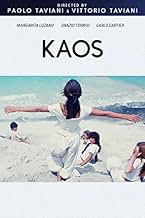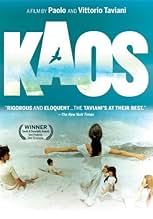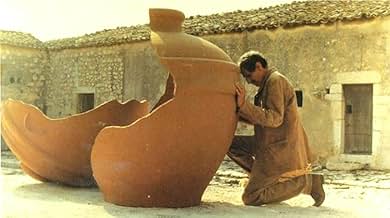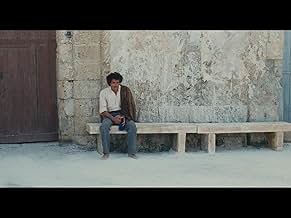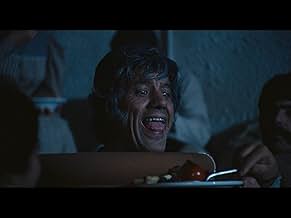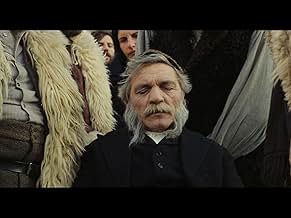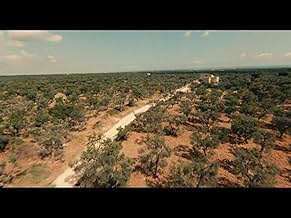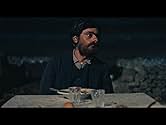IMDb रेटिंग
7.8/10
3.3 हज़ार
आपकी रेटिंग
अपनी भाषा में प्लॉट जोड़ेंFive stories by Luigi Pirandello set in turn-of-the-century Italy.Five stories by Luigi Pirandello set in turn-of-the-century Italy.Five stories by Luigi Pirandello set in turn-of-the-century Italy.
- पुरस्कार
- 4 जीत और कुल 8 नामांकन
Regina Bianchi
- Madre di Pirandello (segment "Colloquio con la madre")
- (as Régina Bianchi)
फ़ीचर्ड समीक्षाएं
I watched this film twice in the 1980s -I think on BBC-but it may have been on channel 4 at the time and was completely captivated by it. it has a haunting quality to it that is hard to surpass and will always stay with you.. Nicola Piovanni composed the music sound score and this Maestro of Music to mood -(see if you can, Caro Diario -Dear Diary Dir.Nanni Moretti as a more modern example of the art) is virtually unknown to the general public over here . Very Sad!.. It is also a complete nonsense that in this technically advanced digital age it is impossible to find a print of this CLASSIC movie -that all film buffs really ought to see-with English SUBTITLES! Spanish ,French and Dutch subtitle versions are around and findable on DVD but ALAS... non comprarlo Inglese!-How Insular! In addition, A Bande Originale -Soundtrack "KAOS" was released on Cd in the early 90s on the Milan label (Europe-USA and S.America?), but again the niche British public not catered for. Bizarrely, when shown on TV in the 80s the movie carried English subtitles-so how does this work then? Anyway back to the film. Enjoy the opening visually stunning shots of the Crow "eagling" its way through mountain landscape and let the accompanying music sink in and you're hooked!.without going into detail-thats for you to discover-the Taviani Bros really bring out the spiritual essence of the Sicilian persona characterised in Pirandello's daily Novellas.It is a flighted sentiment soaring over a gravitated earthy reality-Sicilian Style.This is Cinema at its most alluring.Do see it if it becomes available.
Artfully directed, lusciously photographed, and magnificent scored (in fact, I would say Nicola Piovani's music for this movie is some of the finest I've ever heard in my life), "Kaos" nevertheless leaves something to be desired when it comes to the five tales it tells. The first one, "L'Altro Figlio", is the strongest one emotionally, but it's also quite predictable after a point; you will guess why the mother has denounced her "other son" before it is revealed. The second, "Mal Di Luna", has an intriguing premise, but goes pretty much nowhere with it; when it's over, we're back to where we started. The third, "La Giara", is surprisingly my favorite: it's too slowly paced to work as a comedy, but it works better as an allegory, and it builds to an exhilarating musical sequence that is better seen than described. Besides, it's fascinating to watch the famous Italian comic duo Franco and Ciccio, both noticeably older, acting more mature than you may have ever seen them before! The fourth tale, "Requiem", is, frankly, tedious, and the weakest of the five. The epilogue, "Colloquio Con La Madre", is the part I was most looking forward to, mainly because of Pauline Kael's description of it as a "full-blown epiphany that sends you out dazed and happy". It takes quite some time to reach to that point, but yes, the way this story captures a life-defining moment of sheer happiness will stay in my mind for a long time. Despite my reservations, the experience of seeing and, above all, listening to this movie is not one to be missed. *** out of 4.
Which, unfortunately is impossible for three hours. I've seen it two times in the cinema. The characters are so good, and are given all the time and space to develop starting with MariaGrazia. I really can't think of a movie that's made with more love and dedication. La Giara is a rare but welcome break and watch how Franchi and Ingrassia interact, watch the beauty of baby Bata's eyes in Mal di Luna. Just find out all those details and you won't be disappointed. Having seen Italy after watching KAOS was a feast of recognition, it's really like that, the villages where time stands still, the people, go and see it and you won't be disappointed.
Four Pirandello stories and an original epilogue form a portrait of Sicily, linked by the flight of a raven - bird of ill omen - over the landscape with a tinkling bell around its neck. The film-making is perfect in its calm effortlessness and quiet simplicity, always finding the essence of a situation. Often, the camera makes small, revealing horizontal pans, then pans back and reveals again, as the first subject has changed.
Every episode is infused with a sympathy for whatever simple inescapable sorrow everyone is afflicted with - peasants, grandees, men in uniform - which often seems to seep into them from the land. Even the happiest character in the film - a lawyer - is in bed recovering from an operation. Each story has layers of meaning and a melancholy twist - even the comedic episode finishes on a note of tragedy.
The first story opens as the country is being drained of its men - they're off the America - leaving the parched landscape to the sullen women. An interesting moral dilemma is raised: how if a woman is raped by her husband's murderer and has a child which grows up to look exactly like its father? The bitter irreconcilability stands for the rift between the old land and the new.
In the second story, possibly the finest, a newly married woman discovers that her husband goes berserk, wolf-man like, every full moon. She uses the occasion as an excuse to bring her former lover to her room while her husband rages outside. There's a step forward in the moral arc of the film - reconciliation is possible when you come to understand someone else's suffering.
The Jar is remarkable, not so much for the diabolic overtones of the hunchback who gets trapped inside the giant olive jar he has just mended, as for the surprising bitterness of the landlord whose success is made mockery of by thoughts of death.
Death itself is the subject of the fourth story in which an old man sits over his grave and literally waits for it to come in order to lay claim to the land he will be buried in. Since the land, on which generations become established, becomes in effect composed of the dead, there is a subtle moral question of a man's rights here, suffused with ghostly mysticism - an issue we have lost sight of in the modern world.
The Epilogue is almost too sublime to describe. It may be the most perfect, most meaningful 20 minutes ever put on film. In it, Pirandello himself, weary now of life, travels to his childhood home in Sicily, drawn by the spirit of his mother. She tells him again the story of the journey into exile by boat when she was a girl, only this time filling in some crucial forgotten detail. The span of time held in our mind here is breathtaking - backwards from an old woman long dead who is reflecting on the memory of an intense childhood experience; forwards to her son, now old himself and aware of his own impending death, trying to capture some meaning in it all that is the spark of life, knowing that this spark itself will soon go out. The climax to his mother's story - cascading down a white cliff of powdery white pumice into an azure sea is an image so beautiful, so mixed of elation and despair, that no more words in the film are possible, nor necessary.
Every episode is infused with a sympathy for whatever simple inescapable sorrow everyone is afflicted with - peasants, grandees, men in uniform - which often seems to seep into them from the land. Even the happiest character in the film - a lawyer - is in bed recovering from an operation. Each story has layers of meaning and a melancholy twist - even the comedic episode finishes on a note of tragedy.
The first story opens as the country is being drained of its men - they're off the America - leaving the parched landscape to the sullen women. An interesting moral dilemma is raised: how if a woman is raped by her husband's murderer and has a child which grows up to look exactly like its father? The bitter irreconcilability stands for the rift between the old land and the new.
In the second story, possibly the finest, a newly married woman discovers that her husband goes berserk, wolf-man like, every full moon. She uses the occasion as an excuse to bring her former lover to her room while her husband rages outside. There's a step forward in the moral arc of the film - reconciliation is possible when you come to understand someone else's suffering.
The Jar is remarkable, not so much for the diabolic overtones of the hunchback who gets trapped inside the giant olive jar he has just mended, as for the surprising bitterness of the landlord whose success is made mockery of by thoughts of death.
Death itself is the subject of the fourth story in which an old man sits over his grave and literally waits for it to come in order to lay claim to the land he will be buried in. Since the land, on which generations become established, becomes in effect composed of the dead, there is a subtle moral question of a man's rights here, suffused with ghostly mysticism - an issue we have lost sight of in the modern world.
The Epilogue is almost too sublime to describe. It may be the most perfect, most meaningful 20 minutes ever put on film. In it, Pirandello himself, weary now of life, travels to his childhood home in Sicily, drawn by the spirit of his mother. She tells him again the story of the journey into exile by boat when she was a girl, only this time filling in some crucial forgotten detail. The span of time held in our mind here is breathtaking - backwards from an old woman long dead who is reflecting on the memory of an intense childhood experience; forwards to her son, now old himself and aware of his own impending death, trying to capture some meaning in it all that is the spark of life, knowing that this spark itself will soon go out. The climax to his mother's story - cascading down a white cliff of powdery white pumice into an azure sea is an image so beautiful, so mixed of elation and despair, that no more words in the film are possible, nor necessary.
I saw Kaos, yesterday evening with friends who didn't know it or don't remember it. At this time, Italian cinema produces masterpieces. The emotional power acts after years, specially during the "novel" ends this movie, when Pirandello : at his top, comes back into the family house, re-open it, sees again, the only women he loves and remembers his trip, his family, his feelings : the splendor of childhood, the wildness of this isle, the warm of being protected & loved by his entire family in dramatic circumstances... Well : the music was written by Mozart himself. The beginning of this part is a kind of "Sergio Leone period : once upon in time..." a western like "I"m back" without guns and an harmonica. No action, but only emotion which grows again & again My POW ? A very great movie upon Sicilia, Mens, Women, family, land... See by two directors who knows emotion in movies are more important than 3D effects... God (Ford & Griffith) bless them Sorry my American & English are poor, but I'm just a french guy. See this movie and enjoy it (don't forget a bunch of Kleenex) you will never see that again.
क्या आपको पता है
- ट्रिवियाThe title of the movie comes from a quote of Luigi Pirandello, the author of the book the movies is based on. Pirandello used to say to be a "son of chaos", since he was born in Càvusu, a small village, whose name came from the Greek "Kàos", "chaos".
- इसके अलावा अन्य वर्जनTheatrical release in Italy did not include the segment "Requiem".
- कनेक्शनEdited into Bellissimo: Immagini del cinema italiano (1985)
टॉप पसंद
रेटिंग देने के लिए साइन-इन करें और वैयक्तिकृत सुझावों के लिए वॉचलिस्ट करें
- How long is Kaos?Alexa द्वारा संचालित
विवरण
बॉक्स ऑफ़िस
- US और कनाडा में सकल
- $3,25,717
- US और कनाडा में पहले सप्ताह में कुल कमाई
- $11,412
- 17 फ़र॰ 1986
- चलने की अवधि
- 3 घं 7 मि(187 min)
- ध्वनि मिश्रण
- पक्ष अनुपात
- 1.85 : 1
इस पेज में योगदान दें
किसी बदलाव का सुझाव दें या अनुपलब्ध कॉन्टेंट जोड़ें



